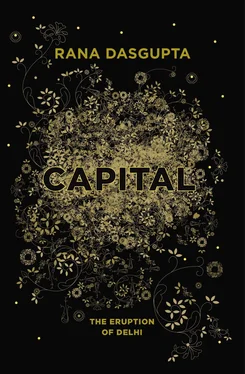Over the top of these garlands he wears a similar number of corporate swipe cards on woven ribbons: those magnetic cards with digital photographs which so many corporate employees wear around their necks to access their offices. He wears thirty or forty of them, keys to the new global networks.
It is a technique that has long stood people in good stead in this much-pillaged part of the world. Hang on to your old gods, but don’t ignore the new.
As I look at him, he grabs one of these magnetic cards and holds it up to me imperiously: “You will go when I say.” He stares into my eyes, and his look is blazing and magnificent. We stare at each other for an indefinable moment: he holds my gaze until he is satisfied that I have accepted his authority. Then he wanders away into the racing lines of traffic. I watch him recede, take my foot off the brake, and set off again for home.
It is said of Indian cities that Calcutta, the former British capital, owned the nineteenth century, Bombay, centre of films and corporations, possessed the twentieth, while Delhi, seat of politics, has the twenty-first.
Before 1911, when the British uprooted their administration and moved it to Delhi, the capital of India was Calcutta, in the eastern state of Bengal. Decades of interaction with imperial personnel had created there an anglicised middle class, which supplied a great number of bureaucrats and professionals to the Raj. One of them was my father’s father, an accountant who worked in British companies all over northern India.
Until the Partition of 1947, which divided the British territory in the west and the east into the two new states of India and (East and West) Pakistan, my grandfather was chief accountant with Commercial Union Assurance in Lahore, and it is from there that my father’s earliest memories float back. They are fond: the family was affluent, the city harmonious. My father remembers affectionately the vibrant mix of Hindus, Muslims and Sikhs in his school, his gracious Muslim headmaster. But as his tenth year drew on, it became apparent that political machinations would mutilate this tranquil existence. As Partition approached, the Police Commissioner of Lahore, Allauddin Khan, who was my grandfather’s bridge partner, became concerned for the safety of his Hindu friend: he sent his car to take the family to the railway station. He then deputed guards to accompany them on the train as far as Amritsar, on the other side of the imminent cleavage. Allauddin Khan probably saved their lives: in the ensuing violence, the building in which they had lived was burned down and the Hindu landlord and his family murdered.
My father’s family returned to Bengal, where the other, eastern, Partition was in progress, and my father found himself on the other side of the game. He remembers the unreal sight of slaughtered Muslims lined up like trophies in the Calcutta streets.
Something seems to have snapped in my grandfather after those upheavals. He became moody and withdrawn. He secured another well-paid position, but walked out of it on a point of principle. Suddenly there was no income for his family of nine children. The electricity was cut off. They could not afford food or candles. My grandfather borrowed from moneylenders to pay his bills; when they sent thugs to reclaim the loans, it was my thirteen-year-old father who had to plead with them in the street, for my grandfather, who wanted to know nothing of all this, was shut up in a room smoking cigarettes and reading English spy novels.
Friends and relatives shunned them. My father got a job selling cooking oil door-to-door, and so kept the entire family from starvation.
He sold, first of all, to people he knew. One day he knocked on the door of an aunt who, seeing how gaunt he was, offered him lunch. From there he took his wares to the house of another aunt, and she too offered him food. Since he did not know when he would be able to eat again, he accepted and sat down to the meal. But he was still in the middle of it when the first aunt came to call and saw him stuffing himself for the second time. Telling the story sixty years later, my father still shakes with the humiliation of having been caught out in such desperation.
Things turned for the better. My grandfather got another job, as chief accountant of a British tractor company. The job was in Delhi: the whole family moved to the capital and took up residence in a district named Karol Bagh — a former Mughal garden, as the name (‘bagh’) implies, settled in the early twentieth century by communities evicted from villages levelled for the British city and, still later, and in much greater numbers, by refugees from Partition. But in the 1950s the place still had a leafy feel: my father remembers parks and lazy streets through which he walked to school. “Delhi was beautiful,” my father says. “I used to borrow a bike and ride all over the city on those enormous, empty roads.”
In an era when the ideal of every middle-class Indian family was a job for life, my grandfather held on to this one for a year. He begrudged his Scottish superior, a Mr McPherson, and decided he would complain about him to the managing director, who worked in Calcutta. Exploiting his position as senior accountant, he arm-twisted the treasurer into giving him money from petty cash to pay for a first-class rail ticket, and departed for Calcutta in search of satisfaction. He was immediately sacked.
My grandfather was an anglophile. His most prominent theory of child-rearing was: “They must speak English.” He demanded English at the dinner table and, when away from home, wrote letters in English to his children in an elegant, fussy hand. But after he was uprooted from Lahore, his situation in British companies seems to have rankled in deep and private ways: certainly it drove him to erupt regularly over indignities, real or imagined, to the dismay of all around him. Plunged back into poverty, the family returned to Calcutta. More jobs came and went. An English boss requested my grandfather not to smoke in the office: he understood this as an anti-Indian slight and walked out of his employment.
My grandmother, who came from a wealthy family, was bent close to insanity by those years of fear and hunger, of social humiliations, of children studying in the stairwell, where the lights were left on for just this purpose by a sympathetic Sikh caretaker. She reminisced endlessly about Lahore, now lost to Pakistan, where life had provided and they had been happy.
It was in this context that my father conceived his plan to redeem the family. Germany was offering cheap passage and guaranteed employment to those who would come there as Gastarbeiter. He decided he would use this as a bridge to studying in England; when he returned, he thought, there would never again be question of unemployment or hunger.
In the weeks before his departure, his anglophile father sat on the balcony calling out proudly to passers-by: “My son is going to England!”
My father embarked in Bombay and spent two of the most carefree weeks of his life sailing across the Arabian Sea, passing through the Suez Canal into the Mediterranean and docking, finally, in Genoa. He took a train to Stuttgart, where he worked for a year as an unskilled labourer in a paper factory. In 1962, he arrived in London. He began to study accountancy and to work for British Rail. With his first pay cheque he bought a Parker pen for his father, who wrote to thank him: “I can say with confidence that the pen you sent me is the most famous pen in India. In Calcutta, at least, there is not a man with eyes who has not seen it.”
He went to look at a room in the house of a young Jewish couple in east London. The wife had arrived as a refugee from Hitler and was the only member of her family to have escaped the Nazi death camps. He liked them, they liked him. But another bedroom was already rented to a white South African, who was alarmed when he realised my father was looking to move in. He took the landlady aside in consternation: “I can’t live with a Coloured man!”
Читать дальше











